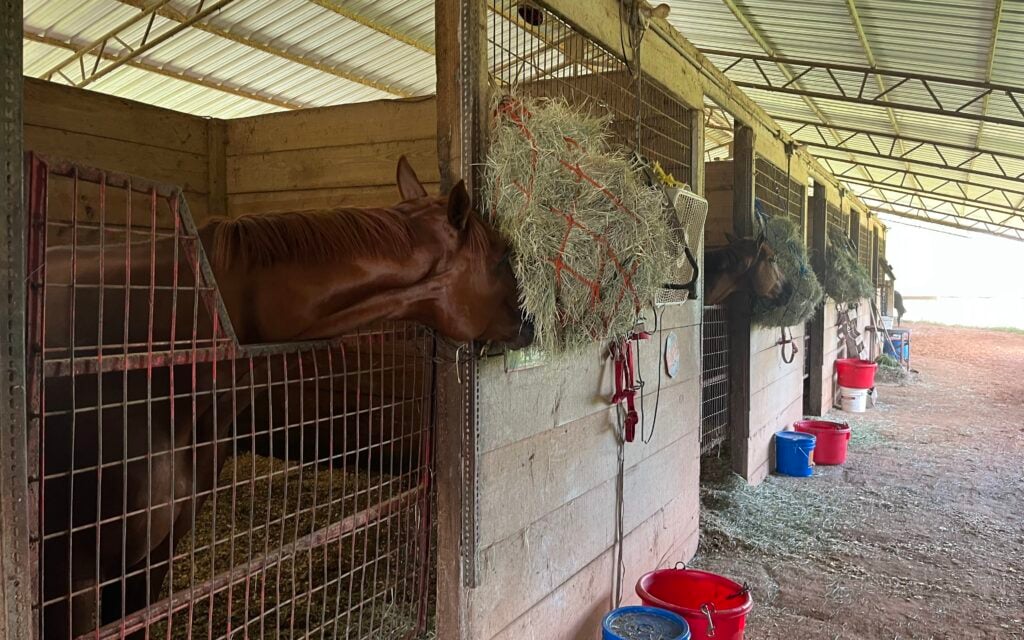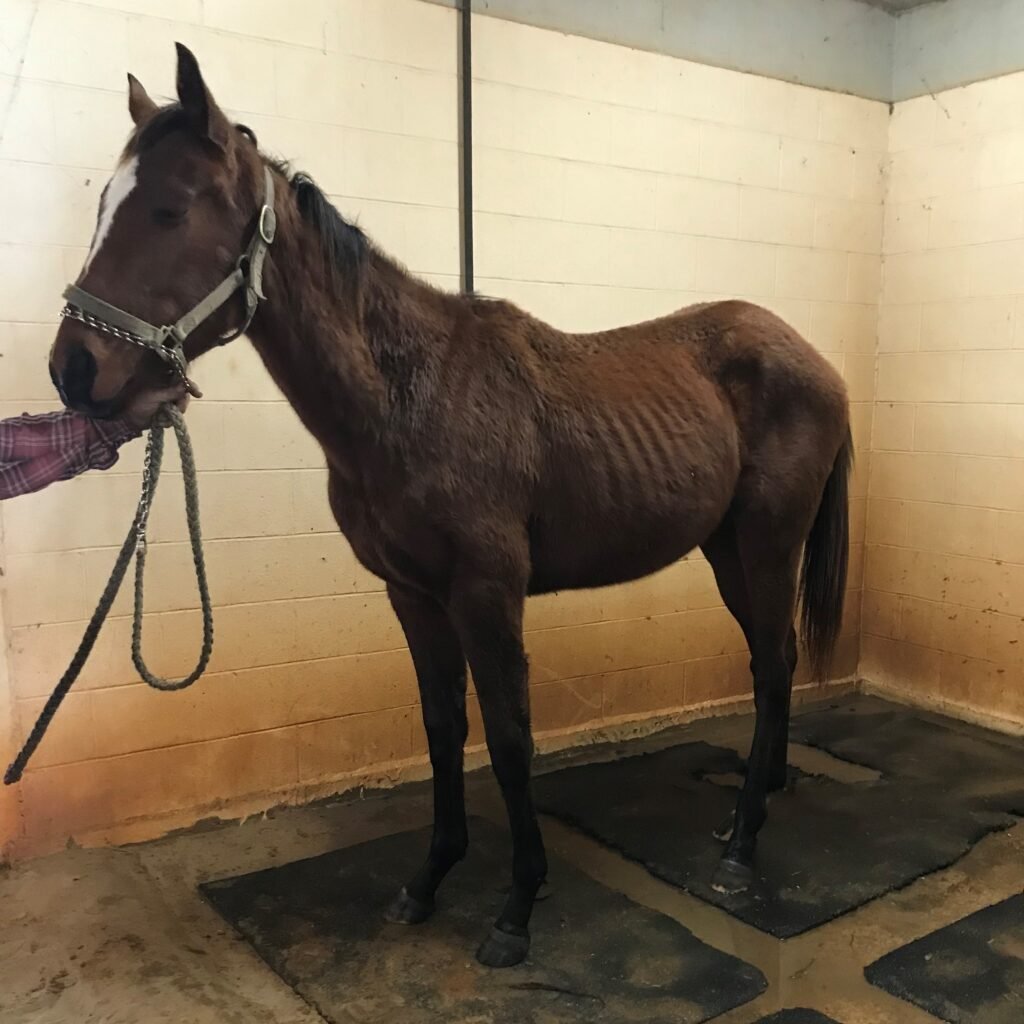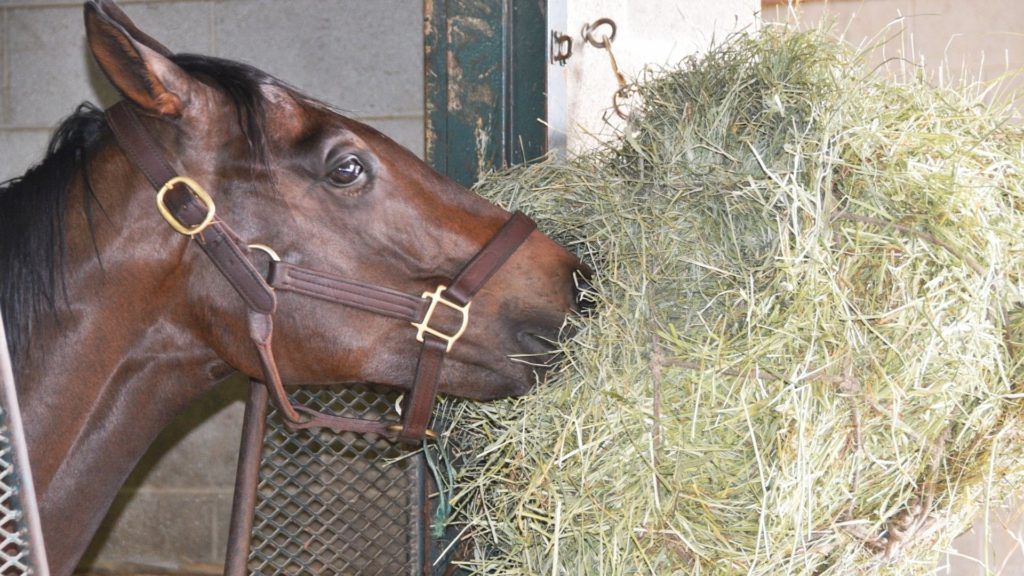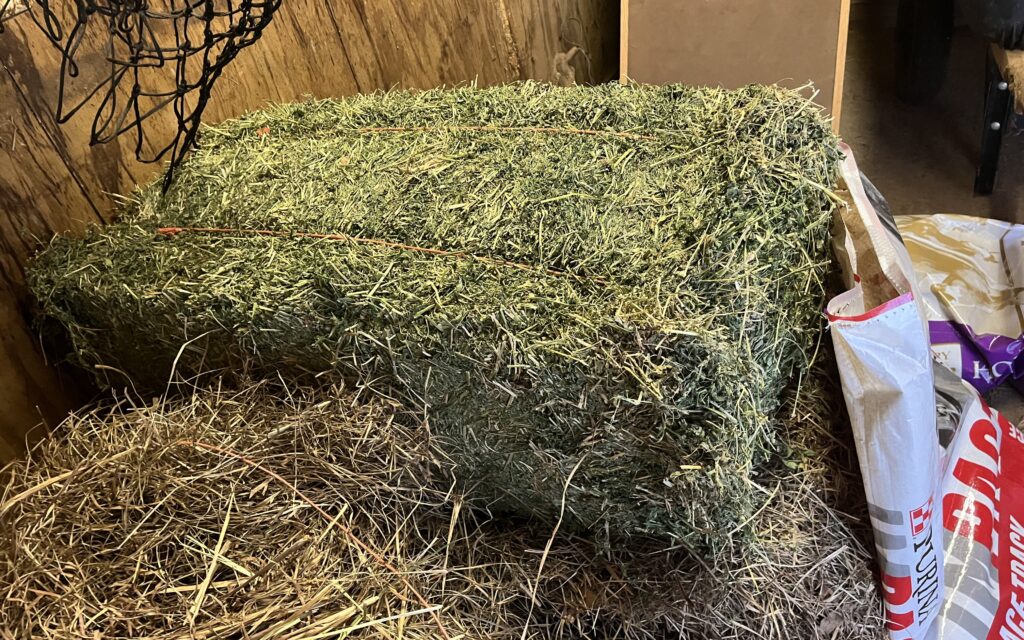Last updated: May 7, 2025
Have you ever wondered how the protein content in hay impacts your horse’s performance? Understanding hay’s nutritional value is crucial for ensuring your horse gets the right balance of nutrients to stay healthy and perform at its best. In this article, I explain the significance of hay protein content and how it affects different types of horses.

What is “Hay Protein Content,” and Why is it Important?
The protein content of hay is a measure of its crude protein based on the number of amino acids present. Amino acids are the building blocks of proteins and are essential for tissue growth and maintenance.
- Essential for Growth and Maintenance: Amino acids are crucial for tissue growth and overall maintenance.
- Minimum Requirements: Most horses require a minimum of 8-10% crude protein in their diet to meet their daily needs. Working horses likely need 15 to 20%.
- Nutritional Value: Hay, low in crude protein, is less nutritious and may not provide enough essential amino acids.
Importance of Choosing the Right Hay
- Digestive Health: Too much protein can cause digestive upset and increase the risk of colic.
- Nutrient Provision: Hay with lower protein content may not provide sufficient nutrients.
- Individual Needs: Ideal hay protein content depends on the horse’s age, activity level, and health status.
Specific Needs Based on Horse Type
- Young, Growing Horses: Require more protein due to ongoing development.
- Performance Horses: Need higher protein due to increased activity and calorie burn.
- Senior Horses: May require more protein as their metabolism slows.
Consulting with a Veterinarian
Consult your veterinarian for specific recommendations on the best hay protein content for your horse. Analyzing the protein content of the hay you provide is essential to your horse’s success, much like a top-level human athlete.

Types of Hay and Their Protein Content
The protein content in horse hay varies depending on the type of hay. Here are different types of hay and their protein levels:
- Timothy Hay:
- High in fiber, easy on the digestive tract.
- Low in protein and energy but high in other nutrients.
- Ideal for senior and overweight horses.
- Protein content: ~8%.
- Bermudagrass Hay:
- Similar to Timothy Hay, common in southern regions.
- Low protein content, easy to digest.
- Good for horses with digestive issues and senior horses.
- Protein content: 8.4-10%.
- Orchardgrass:
- Known for its good flavor and high fiber.
- Higher protein content compared to Bermuda or Timothy Hay.
- Nutrient content is not dependent on cutting time.
- Oat Hay:
- Versatile, grows in cool spring and fall.
- Best for young livestock when cut at the right time.
- More commonly used for livestock than horses.
- Alfalfa:
- High-quality protein source.
- High protein content can cause bloating; it should be used with other hay types.
- Protein content: 12-15%.
Determining Hay’s Protein Content
- Laboratory Analysis: Take a sample and have it analyzed for crude protein.
- Visual and Textural Cues:
- Yellow leaves: Low protein.
- Green leaves: High protein.
- Coarse, dry, and moldy hay: Low protein.
- Soft, fresh-smelling hay: Higher protein.

Risks of Incorrect Protein Levels
Too Much Protein
- Digestive Issues: High protein can lead to digestive issues in horses.
- Obesity and Joint Problems: Excess protein can contribute to obesity, leading to joint problems.
- Disease Risk and Tissue Breakdown: Overconsumption can increase the risk of diseases and cause tissue breakdown.
- Kidney Problems, Arthritis, Hypothyroidism: Excess protein is linked to kidney issues, arthritis, and hypothyroidism.
Too Little Protein
- Poor Growth and Health Issues: Insufficient protein leads to poor growth and overall health problems.
- Lack of Essential Nutrients: A deficiency in protein means the horse isn’t getting the necessary nutrients.

Signs Your Horse is Lacking Protein
High-performance horses, broodmares, foals, weanlings, and yearlings are most susceptible to protein deficiency. Look for these signs:
- Weight Loss: Sudden or gradual, accompanied by lack of energy.
- Abnormal Hoof Growth: Slow or abnormal growth.
- Slow-healing Wounds: Cuts and bruises take longer to heal.
- Dull Hair Coat: Decline in coat condition.
Case Study: Performance Improvement with Balanced Hay Protein
My racehorse, Ashton, showed signs of fatigue and poor coat condition despite a high-calorie diet. Upon analyzing the hay, it was found that the protein content was only 6%. After switching to a mix of alfalfa and Timothy hay, raising the protein content to 12%, His energy levels and coat condition improved significantly within three months.
Tips for Ensuring Proper Protein Intake
- Feed High-Quality Hay: Higher-quality hay has a higher protein content.
- Monitor Intake: The average horse needs about 2% of its body weight in hay daily.
- Supplement Diet: Use grain or pellets if necessary, but consult a vet first.
- Consistent Feeding Schedule: Maintain consistency in feeding times and amounts.

FAQs about Hay Protein Content
What is a good source of protein for horses?
Horses are herbivores, and their diet consists primarily of grass and hay. Hay is a good source of high-quality protein, essential for maintaining muscle mass, coat condition, and reproductive function.
What kind of hay is bad for horses?
Not all hay is created equal. Some types of hay, such as Sorghum, Sudan, Johnsongrass, and Pearl Millet, contain high nitrates and sugars, which can be dangerous for horses (Iowa State Extension).
Conclusion: Hay Protein Content: How It Affects a Horse’s Performance
Ensuring your horse receives the appropriate amount of protein through their hay is vital for their overall health and performance. By understanding the different types of hay and their protein content, you can make informed decisions that cater to your horse’s specific needs, whether they are young, growing, high-performance athletes, or senior horses.
Regular consultation with a veterinarian and monitoring of hay quality can prevent health issues related to protein deficiencies or excesses. By providing the right nutrition, you can help your horse thrive and perform at their best.
Call to Action
For more insights and tips on equine nutrition, visit our comprehensive guide on horse hay. Don’t forget to subscribe to our newsletter for the latest updates and expert advice on horse care and management.
Additional Resources
Video: Below is an “Ask the Vet” YouTube video discussing horses that overeat protein.
Infographic: Below is a handy printable PDF about protein content for your horses.
Related Articles
Following these tips can help ensure your horse gets the right amount of protein from their hay ration daily.

About the Author: Miles Henry
Lifelong Horseman | Racehorse Owner | Published Author
Miles Henry brings over 25 years of hands-on experience training and owning Thoroughbred racehorses. Raised with Quarter Horses and Appaloosas, he’s spent a lifetime learning from horses—on the track, in the barn, and in the field. Today, he runs a small but successful racing stable in Louisiana and shares real-world insights on HorseRacingSense.com, helping horse owners, fans, and bettors navigate the sport with confidence.
📚 Books: View Miles’s books on Amazon »
🎧 Podcast Guest: Animal Tales Ep. 32 |
YouTube Interview
📩 Newsletter: Sign up for racing tips and horse care advice »
🔗 Follow Miles:
Twitter |
Facebook |
YouTube



